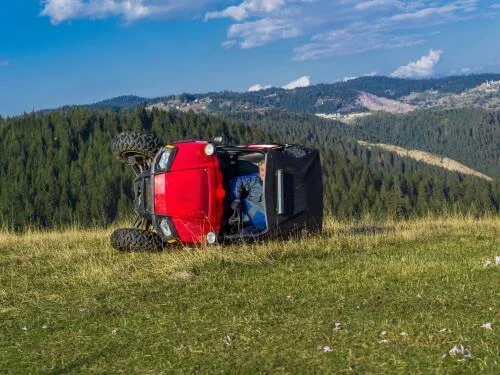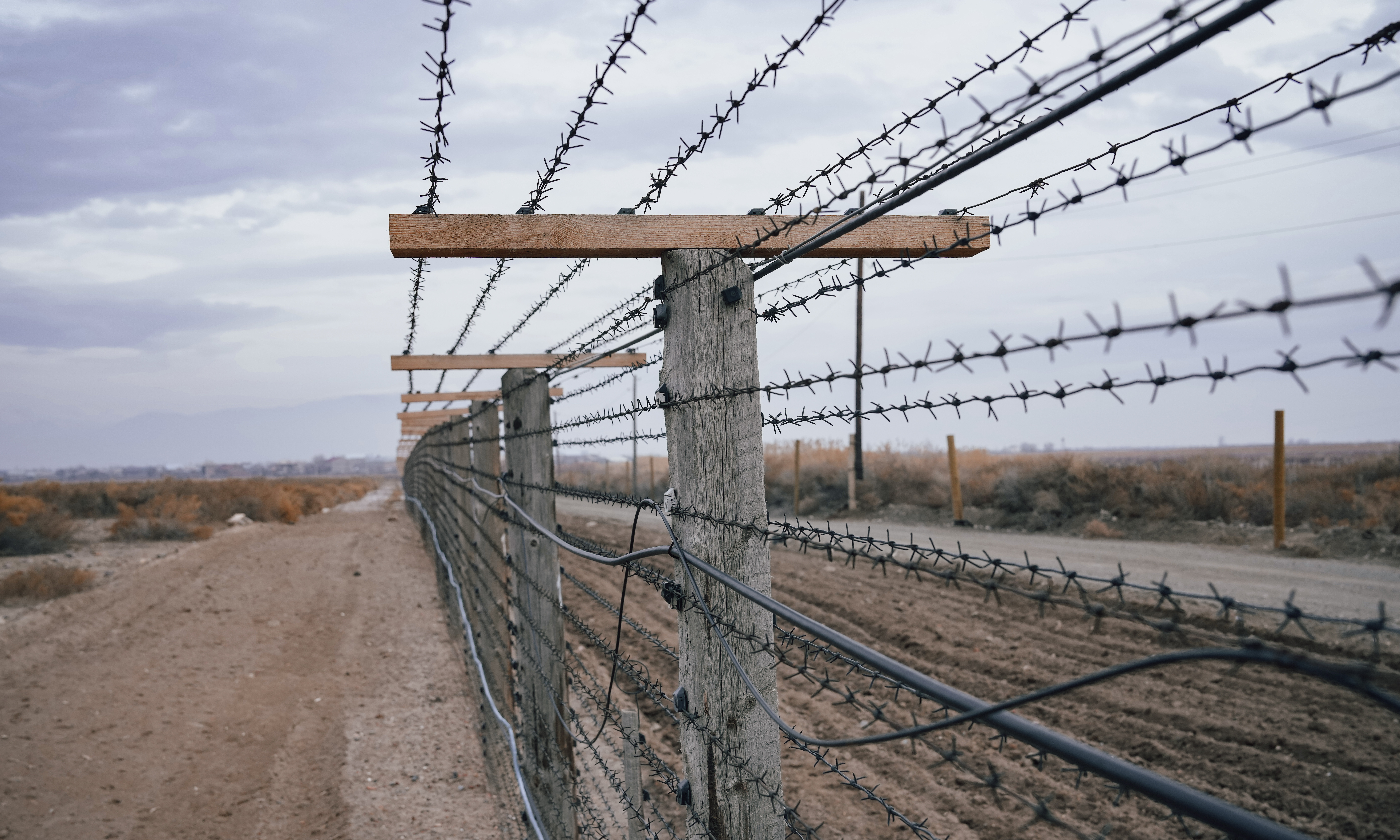 All-terrain vehicles (ATVs) offer recreational fun and convenient transportation across rugged lands but are extremely dangerous. Also known as “four-wheelers,” “quads,” “quad bikes,” and light utility vehicles (LUVs), these small gas-powered vehicles are responsible for hundreds of deaths and hundreds of thousands of injuries across the U.S. each year.
All-terrain vehicles (ATVs) offer recreational fun and convenient transportation across rugged lands but are extremely dangerous. Also known as “four-wheelers,” “quads,” “quad bikes,” and light utility vehicles (LUVs), these small gas-powered vehicles are responsible for hundreds of deaths and hundreds of thousands of injuries across the U.S. each year.
Making matters worse, many ATV accidents are entirely avoidable. Yet, the negligence of vehicle owners, property owners, and manufacturers of defective vehicles leads to dangerous — often deadly — mishaps.
The costs of ATV wrecks can be great, but families don’t have to fight alone for the compensation they need. They can work with the California ATV accident lawyers at Singh Ahluwalia Attorneys at Law to seek damages for their medical bills, lost wages, pain and suffering, and other losses. In instances of wrongful death, we can help families recover funeral and burial costs and the loss of income experienced once the decedent passed.
Reach out to us any time you or a family member has been hurt in an accident involving a four-wheeler, ATV, UTV, or other offroading vehicle. We will provide you with a free, confidential, and no-obligation case review to discuss your strategies available for seeking compensation. When you are ready for someone to listen, we are here. Call (559) 878-4958 or contact us online schedule your free appointment today.
How a California ATV Accident Attorney Can Help Your Case
The burden of dealing with an ATV injury is often great, especially when young children are the victim. However, families have a financial motivation to seek all damages available from all liable parties. This compensation is often the only means they have of paying for medical costs and setting their life back on track.
At Singh Ahluwalia Attorneys at Law, we have helped hundreds of families achieve their goals here in America. Whether that is to obtain citizenship or to avoid the high costs of an injury inflicted by another’s negligence, we are here to help those feeling scared and vulnerable. We protect your legal rights while doing everything we can to ensure that you can recover financially.
When you engage with a California ATV accident lawyer at our firm, you can expect the following benefits:
- Comprehensive case management from start to finish
- Vigorous investigation and legal research to identify liable parties
- Full and accurate calculation of damages, including future medical costs and all lost income
- Sound legal counsel through every step of your claim, keeping you informed and in control of the major decisions
- Fearless representation and negotiation, whether it’s in an informal setting, at an arbitration hearing, or in court we’re unafraid to take on insurers and big money interests
- Assistance designed to give you peace of mind while you and your family focus on recovering
Who Is Liable in an Offroad Vehicle Accident?
There are many different parties who could potentially be seen as at-fault when an all-terrain vehicle flips, collides with a fixed object, or otherwise causes injury to the rider.
Some potential at-fault parties include the following.
The ATV Owner (Including Rental Companies and Resorts)
ATV owners are responsible for ensuring the safe operation of their vehicles under California law and widely held safety best practices. This responsibility is particularly important when minors may have access to the ATV or other offroad-style vehicle.
Vehicle owners are responsible for ensuring that every rider understands the laws they must follow and the safety precautions they should uphold to reduce their risk of injury. Supervision is required for minors under 14, and safety certification is expected when the vehicle is to be operated on publicly accessible lands.
Many harrowing ATV incidents happen when a vehicle owner furnishes the vehicles without care paid to the abilities of the operator or rider. For example, if the person is a minor with no motor vehicle experience and cannot fully reach the controls, the vehicle owner is expected to prohibit use. Similarly, ATV operation is highly unsafe when the operator is under the influence of drugs, alcohol, or other mind-altering substances. ATV owners should take reasonable precautions to ensure that access to the vehicles is limited to those able to safely operate them.
Resorts and rental companies frequently furnish ATVs, as do service providers such as guided hunting tour operators. While vehicle operators and passengers sign liability waivers in most instances, these documents do not free businesses from their expected duties of care. Extreme and reckless disregard for safety and patterns of negligent actions can be sufficient to establish liability in many such cases.
The Land Owner (If the Rider Had Permission to Access)
Landowners are responsible for taking reasonable measures to ensure the safety of those invited to or given permission to access their property. Any trails should be well-maintained, or else they should be clearly marked for hazards like loose leaves, washouts, and other obstacles. Sections of the property unfit for riding, such as those located near steep drop-offs, should be cordoned off and/or have signs clearly posting that entry is unsafe.
Operators of ATVs are generally expected to exercise care for their own health and safety, but they may not be able to prepare themselves for unforeseeable hazards that the property owner was aware of — or should have been aware of. By the same token, property owners should only permit access to areas safe for riding or at very least provide ample warning to the ATV operator to look out for known or likely hazards.
Note that California law (Vehicle Code 5075.4) states that “no adjoining property owner is liable for any actions of any type resulting from, or caused by, trail users trespassing on adjoining property.”
A Negligent Motor Vehicle Operator
In cases where a passenger is injured by the negligent actions of an offroad vehicle operator, the operator may be held liable for the resulting damages. Similarly, if the operator of another motor vehicle causes an ATV accident through negligent driving behaviors, they may be held liable for any resulting costs of injuries and other related losses.
ATVs and most other “off-highway” vehicles are forbidden from operation on public roads, except when crossing at a safe angle at an intersection or other safe crossing space. Even still, intoxicated or careless drivers can cause collisions with ATVs riding alongside or near public roads. Just like in a car accident, the person who ultimately caused the collision — by way of careless behavior or a failure to act in a reasonably safe manner — is considered liable.
The Manufacturer or Retailer of a Defective Vehicle
ATVs, UTVs, and other vehicles are the frequent subject of recalls. Just recently, Honda recalled all of its 2022 model year TRX90X ATVs because “the vehicle’s throttle cable can get stuck, posing crash and injury hazards.”
Unsafe designs, manufacturing defects, faulty parts, and failures to warn all constitute situations where a vehicle manufacturer could be held liable for any resulting injuries or deaths.
Similarly, when a business that distributes or sells these vehicles introduces a defect, they could be held liable for resulting injury damages. For example, a retailer could have failed to store a vehicle properly or failed to perform a safety inspection after the vehicle was provided for demo rides.
Ultimately, the party that introduced the defect is considered liable for the harm they caused under California law.
How Many Injuries and Deaths Do ATVs Cause in California?
A review of available state-specific data concerning ATV-related deaths from 2000 – 2007 found that California saw 385 deaths during the observed period, or 3% of the total deaths nationwide. Relative to its population, California had a lower death rate than other states, but this rate only accounted for the statewide population — not the number of deaths per vehicles operated.
Even still, the linked report concluded that states requiring helmet usage, such as California, saw fewer fatal injuries from ATV accidents.
Crosscountry, ATVs pose a major risk to public health and safety. The latest report on ATV safety from the Consumer Product Safety Commission (CPSC) observed that from 2016 – 2018, there were 2,211 deaths nationwide related to ATV accidents. The report included all forms of off-highway vehicle (OHV), but “ATVs accounted for nearly three-quarters of the deaths.” Making matters most concerning, just under 300 of these deaths involved minors under the age of 16.
On average, CPSC data shows an average of over 700 deaths a year and around 100,000 emergency department visits connected to ATV crashes.
Serious and fatal ATV accidents have also been on the rise in the U.S. in the past few years, especially among young children. A recent safety report found that “over the past 25 years, each day, an average of 31 children were treated in U.S. emergency departments for ATV-related head and neck injuries.”
Common Causes of ATV Accidents in California
There are many reasons an ATV could be involved in a mishap, many of which relate to operator inexperience or hazardous conditions.
The following are some of the most prevalent causes of ATV accidents in California and elsewhere.
Rollover
A rollover or “flip” accident involves the ATV rotating along its length, with the seat and handlebars making contact with the ground. Often, the rider is ejected and/or crushed under the vehicle in the process. Rollovers are particularly deadly when young children are involved, as their lighter frames can be smashed by the heavy weight of the vehicle rolling on top of them.
Trail/Road Runoffs
The rider can become disoriented when a vehicle suddenly departs a fixed path. Loose leaf litter, gravel, mud or dirt, steep dropoffs, and other hazards can await occupants who leave the trail or roadway they were previously on. This situation can result in rollovers, ejected riders, collisions with objects, and other dangerous scenarios.
Tire Blowouts
ATV tires are operated at relatively low pressure, giving them the opportunity to be pinched, punctured, or delaminated from the wheel, even at low speeds. The tire may also have been defective or inflated at an improper PSI.
Collision With Another Vehicle
ATVs and public roads don’t mix. Yet, riders all too often choose to operate on or near roads where other vehicles travel. Further, even when ATVs operate safely near roadways, there is still the risk that another driver could somehow cause an accident through carelessness or reckless driving behaviors.
While one might think that the majority of ATV accidents involving a collision with a passenger or commercial vehicle would happen on a busy road, this is far from the case. According to data from the IIHS, “seventy-three percent of ATV riders killed on public roads in 2020 were on rural roads. Of those, 88 percent were on minor roads.”
Impact With Stationary Objects
ATV crashes commonly involve impact at speeds of 30 MPH or greater with trees, fences, boulders, signage, parked vehicles, and other stationary objects. Even a low-speed crash can produce devastating injuries because of the lack of safety protections in many OHVs.
Rider Inexperience or Intoxication
Alcohol and ATVs don’t mix, and neither do mind-altering substances like marijuana, cocaine, and other recreational drugs. Even operating an ATV while drowsy can dramatically raise the probability of a serious accident. Vehicle operators will have slowed reaction times, a higher propensity for dangerous behaviors, and impaired decision-making ability.
Children also possess a lowered ability to safely operate an ATV, particularly when using a full-size offroad vehicle intended for use by adults. They may be unable to regain control in situations where an adult might, and their ability to calculate risk and the physical feasibility of certain maneuvers can lead them to make dangerous decisions.
Lack of safety equipment can also be a major contributing factor to the severity of injuries. According to safety experts, the most common injuries that occur in minors result from falling off the vehicle without a helmet or other recommended safety gear.
Damages Available in an ATV Crash Claim
Every ATV accident case will involve unique losses and differing factors that could affect the size of a potential settlement.
For example, the severity of the injury will significantly affect the damages inflicted by medical bills, lost wages, or permanent effects like a disability.
Some common injuries in ATV accidents include the following:
- Broken bones
- Internal bleeding
- Traumatic brain injury (TBI)
- Spinal cord injury
- Burns and abrasions
- Lacerations (deep cuts)
- Crushing injuries
An injury victim can seek to recover the costs of their medical treatments while requesting compensation for their other damages, such as the future costs they will experience due to follow-up care.
The losses experienced by the victim — called “damages” — are separated into two main categories: economic (or “special”) damages and non-economic (or “general”) damages.
Economic damages encompass any and all costs that were considered reasonable and necessary to make the victim whole again after their crash. Examples include:
- Emergency medical transport and treatment
- The costs of surgery, medication, diagnostics, and care
- Transportation or parking costs to get to medical appointments
- The costs of prescribed over-the-counter medications or medical devices
- Lost wages and other income (including loss of sick days)
- Any out-of-pockets directly connected to injury care or the accident
- Repair/replacement of damaged or lost property
- Costs for mental health counseling related to PTSD
Non-economic damages don’t have a concrete dollar amount, but they inflict a high cost on injury victims. They include things like:
- Mental anguish
- Personal pain and suffering
- Loss of enjoyment of life
- Loss of ability to participate in family bonding activities
- Loss of companionship of a deceased loved one
The attorneys at Singh Ahluwalia will make every effort to investigate your injuries, document your costs, and seek total and fair compensation from all liable parties.
Talk to ATV Accident Lawyers in California Who Care
ATVs and other offroad vehicles are supposed to bring joy, but they can bring even greater quantities of sorrow. When a vehicle owner, property owner, or product manufacturer is negligent, the potential for an ATV wreck to inflict major injury or death is great.
Let the California ATV crash lawyers at Singh Ahluwalia Attorneys at Law help you during your time of great need. We hold compassion for injury victims and others who may be suffering from the result of negligence or an unfair system. Rest assured that we will fight for your legal rights to seek compensation, and we are unafraid to stand up to insurers and others who wish to deny you the ability to recover fully.
Learn more about your legal rights and options during a free, no-obligation case review. Call an experienced California injury lawyer near you, and schedule your free appointment when you call (559) 878-4958 or contact us online.


